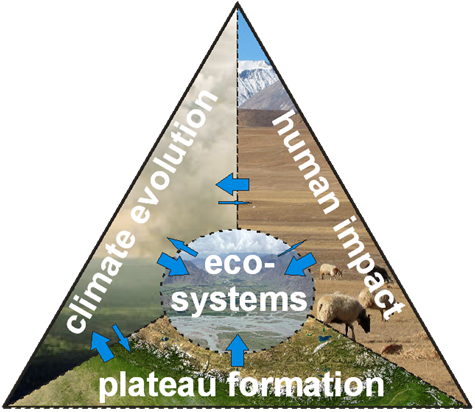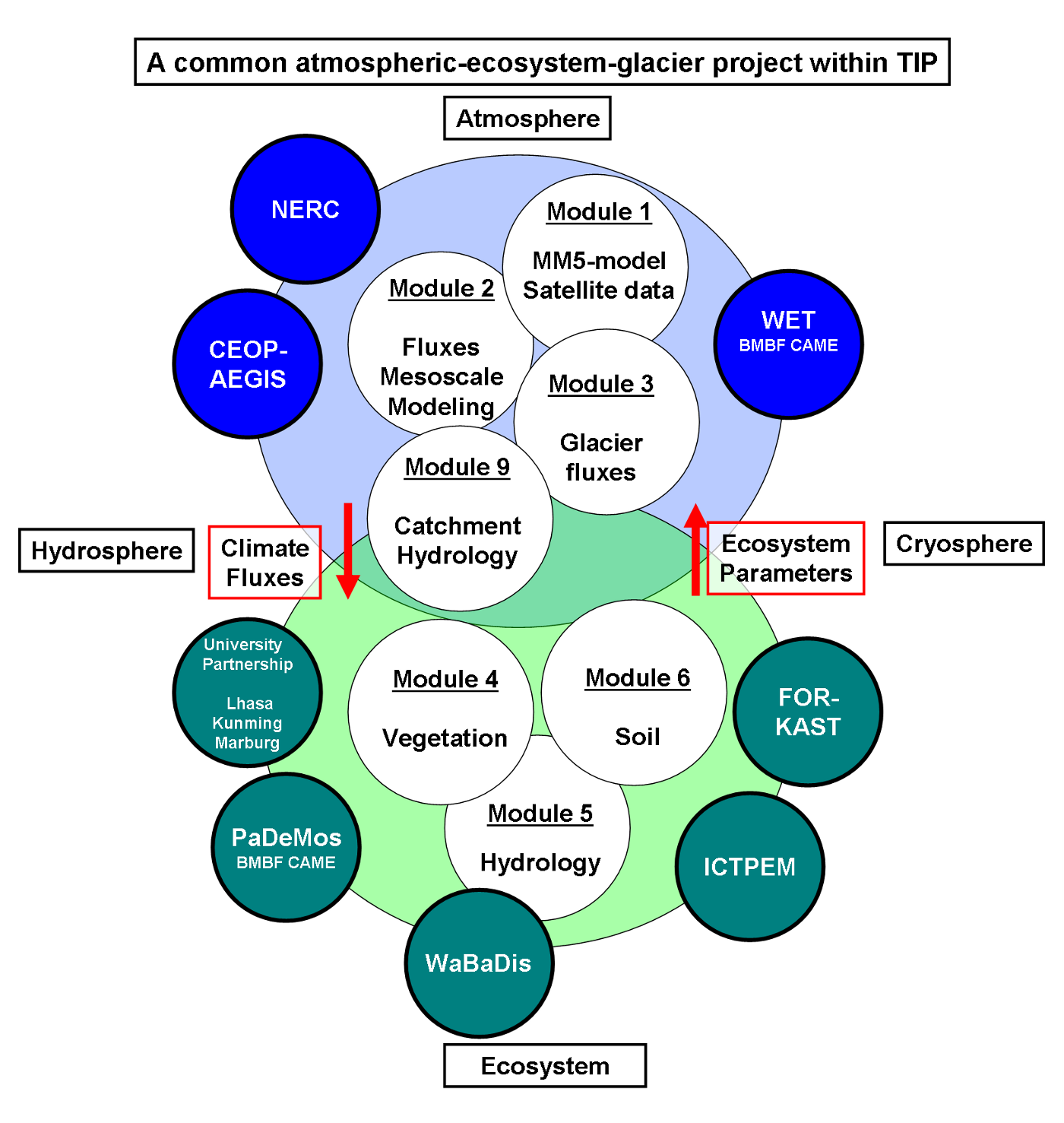Overview of the structure and cooperations of the cluster
|
|
Module | Project |
| 1 | 2005CB 422003 | |
| 2 | DFG Fo 226/18-1.2 (SPP 1372) | |
| 3 | DFG SCH 680/3-1 (SPP 1372) | |
| 4 | DFG MI (SPP 1372) | |
| 5 | ||
| 6 | DFG KU 1184/14 SPP 1372 TIP |
|
| 9 | DFG FL 141/28-1 , HO 1840/8-1 (SPP 1372) |
Cooperation of the Cluster with other Projects:
CEOP-AEGIS (EU Seventh Framework Programme, FP7): Hydrology and Climatology of the Tibetan Plateau
Partners: Yaoming Ma (Institute of Tibetan Plateau Research), Thomas Foken (Univ. Bayreuth)
| Ground based observations of radiative and convective fluxes and soil moisture over the Plateau at a limited but representative set of permanent sites (related to Modules 1-3). Link |
WET – Variability and trends in main components of water budgets in benchmark regions of the Tibet-Plateau (BMBF CAME)
Partners: TU Berlin, Univ. Jena, Univ. Tübingen, TU Dresden, RWTH Aachen, Univ. Marburg.
| System (iMoMoS-WET), to investigate the coupling of climate and water cycles, explicitly considering the topographical and land cover dominated processes, for selected benchmark catchments of the Tibetan Plateau and adjacent mountain ranges. The system includes numerical models and high-tech satellite-based monitoring technologies of all relevant atmospheric, hydrological and glaciological parameters. The system will be fully integrated into a web-based GIS-platform. (related to Module 3 and 9).The WET research project focuses on the development of an integrative Model and Monitoring |
|
| Homepage Berlin Homepage Jena Homepage Aachen Hompage BMBF CAME | |
PaDeMoS, Pasture Degradation Monitoring System (BMBF CAME)
Partners: Georg Miehe / Jörg Bendix / Christoph Reudenbach (Univ. Marburg); Karsten Wesche / Bernhard Seifert / Hermann Ansorge (Senckenberg Gesellschaft Görlitz); Volker Mosbrugger / Dieter Uhl (Senckenberg Gesellschaft Frankfurt); Yongping Yang (Kunming / Lhasa); Ruijun Long (Lanzhou), replaces and amends former Module 7 - Satellite Supported Mapping of Grazing Gradients).
Development of a comprehensive indicator system for rangeland health in Tibetan Kobresia pastures; based on a broad array of biotic indicators and tested for all major regions of the Tibetan highlands. Indicators will be combined with analysis of reflective properties of rangeland degradation stages allowing upscaling and large-scale monitoring with remote sensing methods (related to Modules 1, 2, 4/5, 6). Data will be accessible through an online platform including Web-GIS functions, tools for data queries and classification algorithms for degradation assessment. (related to Module 4).
Homepage PaDeMos Hompage BMBF CAME
WaBaDiS, Water balance under different surface conditions in Kobresia meadow
Partners: Keith Richards, Siyuan He (Cambridge Overseas Trust, Univ. of Cambridge)
Observation and assessment of water balance and water movement along the soil-plant-atmosphere continuum under various surface conditions by lysimetry and water stable isotopes. On the premise of soil degradation and the special topographic units of mountain basins, the degradation-induced land cover change alters the moisture fluxes including a suppression of the dewfall, so that evapotranspiration and the energy balance are changed, which then influences cloud formation and precipitation, and therefore may have effects over a wider region. Implementation of the results with meso-scale model to identify moisture induced convection and upscaling with eddy-covariance measurements (related to Module 2, 4). Link
NERC IMPCAM (Natural Environment Research Council, IMPerial College - CAMbridge University)
Partners/applicants: Hans-F. Graf / Michael Herzog (Univ. Cambridge), Chris Pain (Imperial College London)
Integration of the FLUIDITY algorithm, developed at Imperial College London into ATHAM in order to achieve a better representation of topography through an unstructured grid. Additionally an adaptive mesh will allow the adjustment according to local flow conditions, improving model performance. The project will start in Feb. 2010 (related to Module 2).
ICTPEM - International Centre for Tibetan Plateau Ecosystem Management, partners Ruijun Long (Lanzhou University)
Partners: K. Wesche, together with G. Miehe, G. Guggenberger and others.
PaDeMoS serves as a further step towards a joint Sino-German research centre on Tibetan Plateau Management. The aim of establishing this centre was developed during a workshop organised by R. Long and K. Wesche and funded by the Sino-German Centre for Research Cooperation (NSFC / DFG). This was followed by a memorandum on further cooperation between partners and by a visit of R. Long to Germany. The centre further developed using different funding schemes including DAAD, BMBF and DFG (related to Module 4, 6).
FORKAST, TP5 (Bavarian climate research programme), Investigation of carbon turnover in grassland sites in Northern Bavarian low mountain ranges under extreme climate conditions
Partners: Thomas Foken (Univ. Bayreuth), Yakov Kuzyakov (Univ. Göttingen)
Changes in photosynthetic activity and modified assimilate translocation characteristics from the leaves into roots and soil. Detailed information about the reaction of different plant species allows predicting the stability and resilience of plant species composition in grasslands (relates to Modules 2 and 6). Link
University partnership Lhasa – Kunming - Marburg (DAAD / German Academic Exchange Service, TiP Young Scientist Program),
Partners: Georg Miehe (Univ. Marburg), La Duo (Univ. Lhasa), Ou Xiaokun, Yang Yongping (Yunnan University, Kunming Institute of Botany, CAS/Kunming Branch ITP).
International Field Courses Mountain Ecology / summer schools are conducted regularly (2005, 2007, 2008, 2009, 2010) with focus on land use and land cover changes in alpine pastures and forests of the southeastern Tibetan plateau with students from China and Germany and project members of the “Kobresia cluster (TiP)”. Demonstration sites are the grazing exclosure plots in Qinghai, at Kema and around Lhasa.



 © WET
© WET